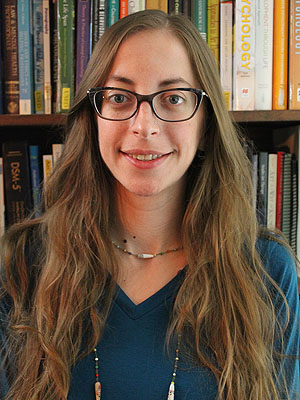-
Meet the Counselors: Jessica Hauck LAC, ATR-P
- Posted on September 15, 2021
- by admin
- in All Articles, NFSB Blog
- Comments Off on Meet the Counselors: Jessica Hauck LAC, ATR-P
 Jessica Hauck, LAC (Licensed Associate Counselor), ATR-P (Provisional Registered Art Therapist) was always interested in art therapy as a modality when she was younger. When she went to the College of New Jersey, however, she decided to pursue her undergraduate degree in fine arts with the goal of becoming an artist.
Jessica Hauck, LAC (Licensed Associate Counselor), ATR-P (Provisional Registered Art Therapist) was always interested in art therapy as a modality when she was younger. When she went to the College of New Jersey, however, she decided to pursue her undergraduate degree in fine arts with the goal of becoming an artist.It wasn’t until a couple years after Jessica graduated that she realized she wanted to do something more and give more to the community. When she started looking at master’s programs, she discovered the Caldwell University art therapy program.
“What I loved about the Caldwell program was that it included the mental health counseling component, almost like a dual program,” Jessica said. “It was actually the first art therapy program in the country that was also accredited as a counseling program.”
While pursuing her master’s degree, Jessica started looking for internships that would give her experience with different patient populations and different severities of mental illness, ideally in a community-driven center. This brought Jessica to Nutley Family Service Bureau (NFSB), first as an intern and now as a clinician.
Art Therapy in Clinical Practice
Jessica has volunteered on the National Suicide Prevention Lifeline and Caring Contact, which essentially involved phone hotline counseling for people in a crisis. This didn’t incorporate art therapy, but the experience did help her hone her verbal skills.Jessica started using art therapy during her internships, one of which involved working with children experiencing bereavement or undergoing hospice themselves.
“Art therapy is extremely beneficial because there can be so much grief and trauma that it feels impossible to put into words, especially early on when it’s still fresh,” Jessica said. “Children might not even know the words, so using art therapy with kids who just lost someone or were trying to process their own illness gives them another way to express themselves.”
Jessica would work with children in the bereavement program to make heart-shaped boxes. They would take a Valentine’s Day box and decorate it inside and out with different things that reminded them of the person they lost and how that person made them feel. The box also had a lid that they could eventually close.
If a child is struggling to express an emotion such as anger, art therapy can be a coping strategy, providing a healthy outlet for that energy. The child can be productive instead of destructive, for example, by tearing up construction paper instead of something important.
Art therapy can also be used to assess a client of any age, whether the individual is a new client or recently experienced a change. Using a specific art therapy directive, Jessica can gain a better understanding of what the situation is, the client’s relationship with certain family members, how the client feels about certain situations, and how she might be able to help the client.
“There are art therapy assessments that have been heavily researched and developed for specific purposes,” Jessica said. “It’s important that the assessment is only based on art created in front of the therapist. In addition to the art itself, I assess the process of creating the art, which will likely convey certain emotions.”
Published Author and Researcher
Jessica has been actively involved in research since she was a graduate student and is still a member of the research team at Caldwell University. She collaborated with co-author Dr. Thomson J. Ling, Professor and Associate Dean of the School of Psychology and Counseling at Caldwell, to create an ethical decision-making model for both counseling and art therapy.“This five-step model can help a therapist determine the next course of action when they’re not sure what that next step should be,” Jessica said. “Many ethical codes for mental health work are unclear and have a large gray area. Our model helps them make the most ethical decision.”
Jessica has had a number of papers published and is working a on a textbook titled Navigating Ethical Dilemmas in Creative Arts Therapies: A Case-Based Approach. The new book is expected to be in print in January 2022.
“Because of my background in research and quality assurance, practicing within an evidence-based framework is important to me and beneficial to clients,” Jessica said. “Seeing progress and just being able to watch it click for the client is very rewarding. At the same time, I believe in the wellness model that says you don’t have to be sick to get better. Therapy is appropriate for anyone who wants to be in a better place tomorrow than they are today.”
If you’d like to learn more about art therapy and other mental health services and techniques at NFSB, call 973-667-1884.
If you enjoyed this article please consider sharing it!

















